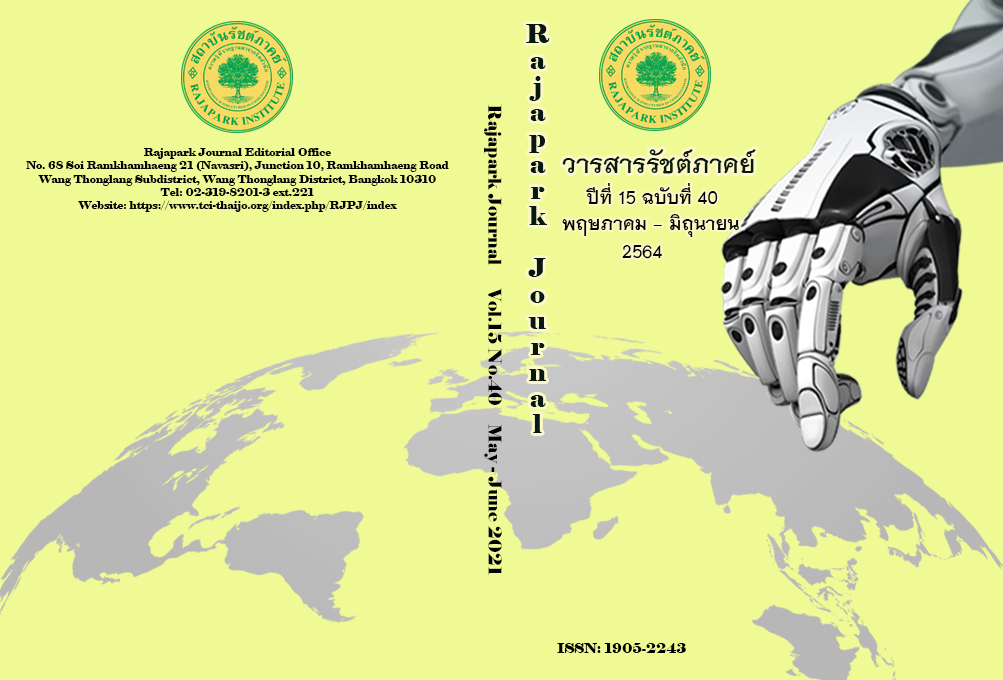Success Factors Sustainable Ecotourism Management of Kiriwong Village Community Nakhon Si Thammarat Province
Main Article Content
Abstract
This research aimed to 1) study the sustainable ecotourism potential of Kiriwong village community Nakhon Si Thammarat Province 2) study the success factors of sustainable ecotourism management Kiriwong village Nakhon Si Thammarat Province it is a qualitative research. With important information providers Who are involved in the ecotourism development of the Kiriwong village community Nakhon Si Thammarat Province totaling 30 persons. The research instruments were in-depth interview and questionnaires. The research results showed that 1) the potential ecotourism sites of the Kiriwong village community Nakhon Si Thammarat Province, Including Nan Hin Tha Ha, Suspension Bridge - Tha Ha, Srithammasokrat Cave, Wang Mai Pak Waterfall. Local potential, found that the area has great economic potential and opportunities. Since it is ecotourism, there is biodiversity. The community's products were produced for sale in a concrete manner. 2) Results of the study of success factors in expressing opinions of the government, private sector, citizens and tourists on factors affecting the success of sustainable ecotourism of the Kiriwong village community. Nakhon Si Thammarat Province. There is a biodiversity of resources. Affect the success of sustainable ecotourism management. Able to organize ecotourism activities focusing on eco-tourism models.
Article Details
Views and opinions appearing in the Journal it is the responsibility of the author of the article, and does not constitute the view and responsibility of the editorial team.
References
Chulvanich, S., & Wattanapradith, K. (2019). Women and Sangha: A Study of Ways for Women’s Participation in the Development of Mahachulalongkornrajavidyalaya University. Journal of MCU Peace Studies. 7(Supplemental Issue), 122-135.
Junead, J. et al. (2018). Patterns that Affect Success of Sustainable Ecotourism Management of Bang krachao Community in Samut Prakarn Province. Christian University of Thailand Journal, 24(4), 548-561.
Kerdjan, O. (2014). The Participation of Local Communities in Eco-Tourism Management at Klongkon Mangrove Forest in Samutsongkhram Province. Master of Arts, Department of Tourism Management. Dhurakij Pundit University.
Kongprasert, P. (2008). Integrated Ecotourism Planning for Sustainable Tourism Development on Pha-ngan Island, Suratthani Province. Master of Science, Ecotourism Planning and Management. Srinakharinwirot University.
Moonchua, B (2020). Ecotourism Management System for Royal Thai Navy. Mahachula Academic Journal, 7(1), 289-300.
Nakhon Si Thammarat Provincial Cultural Office. (2017). Khiriwong village, Nakhon Si Thammarat. Retrieved from https://www.m-culture.go.th/nakhonsrithammarat/more_news.php?cid=31
Phramaha Nat Sativepullo. & Wattanapradith, K. (2019). An Analytical Study of Peaceful Culture of Pow Karen Ethnic Group: A Case Study of Sanepong Village, Laiwo Sub-District, Sangkhlaburi District, Kanchanaburi Province. Journal of MCU Peace Studies. 7(Supplemental Issue), 91-106.
Untachai, S. (2011). The Development of Integrated Ecotourism Marketing Management to be Sustainable in Upper Northeastern, Thailand. Udon Thani: Udon Thani Rajabhat University.
Wittayathanaratana, S. (2011). The Future of Technology in the Travel Industry Part 1. Retrieved from http://www.etatjournal.com/mobile/index.php/menu-read-tat/menu-2011/menu-2011-oct-dec/66-42554-technology-tourism
Yangprayong, P., & Chuaymanee, S. (2016) Ecotourism of Thai tourist: The case Visiting Phu Pha Phet Cave, Satun Province. Economics and Public Policy Journal, 7(13), 56-70.


